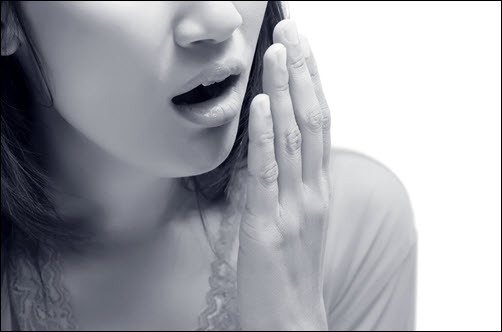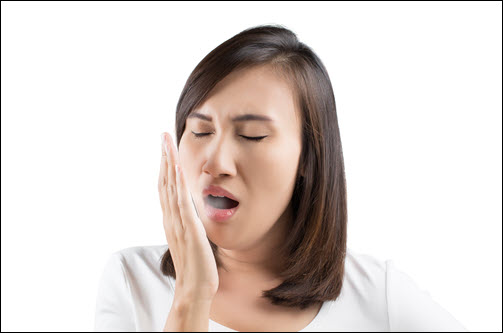Fixing Halitosis (Bad Breath)
Halitosis, otherwise known as bad breath, affects everyone from time to time. But for some people, it can be a serious problem. And while frequent brushing is often enough to overcome bad breath, there are other approaches to keeping bad breath away.
Common Causes of Bad Breath
 Bad oral hygiene – Not surprisingly, one of the biggest causes of halitosis is not caring for your teeth and gums. Failing to brush and floss regularly allows food and bacteria to build inside your mouth, on your inner cheeks, tongue, and between teeth and gums. These bacteria emit an odor.
Bad oral hygiene – Not surprisingly, one of the biggest causes of halitosis is not caring for your teeth and gums. Failing to brush and floss regularly allows food and bacteria to build inside your mouth, on your inner cheeks, tongue, and between teeth and gums. These bacteria emit an odor.- Dry mouth – Your mouth’s saliva is part of your immune system. When you don’t drink enough water or if you take medications that slow saliva production, your mouth begins to dry out and halitosis becomes an issue. Some medicines can cause dry mouth.
- Acid or sugar-filled diet – What you eat affects your breath, especially foods high in acid, such as tomatoes, garlic, or an abundance of sweets. They may taste good, but they can have lingering aftereffects.
- Tobacco products – Cigarettes, cigars, smokeless tobacco, and related items have numerous adverse effects on your health. Talk to your doctor or dentist about ways to break these habits.
- Periodontal disease – Gingivitis and periodontal disease affect gum health and can be caused by bacteria building up below the gum. They also cause bad breath and leave a bad taste in one’s mouth.
- Certain Diets – The keto diet is often associated with bad breath. Dieting habits can, too. One may not eat as often when dieting, and the mouth gets dried out. More so, when your body breaks down fat, certain chemicals are released that can cause halitosis.
Keeping Halitosis Away
- See your dentist often. The minimum is twice a year, but if halitosis or other dental problems are a concern, you may wish to plan more frequent visits. Talk to our Marysville Family Dentistry staff to learn what would be best for your needs.
- Replace your toothbrush often. Use a soft bristle toothbrush, then replace it whenever it shows signs of age. Replacing your toothbrush every 3-4 months is best.
- Keep your mouth moist. Minimize, if not avoid, caffeine, spicy or acidic foods, tobacco, and a sugary diet. Drink plenty of water and keep sugar-free candies or gum on hand. If you battle dry mouth, talk to one of our team members about an artificial saliva medication.
- Brush and floss your teeth. You should floss and brush two times a day. However, if halitosis is an issue, doing this more often prevents plaque buildup and leaves you with fresher breath. Don’t put off brushing once you have finished eating. The sooner you brush, the lower the risk of bad breath occurring.
- Brush your tongue. Bacteria cling to the tongue because of the moisture. Brushing your tongue or using a tongue scraper prevents any buildup.
- Clean appliances, guards, and bridgework. While beneficial for your teeth and smile, these items can also cause bad breath if not carefully maintained. Be sure to brush these items daily. There are many products available to clean these items. Call our Marysville Family Dentistry office about what would be best for your needs.
Don’t stress over bad breath. You can meet people with ease by making these practices a part of your routine. Talk to one of our dental team members today to learn more about halitosis and the best preventative steps for you.



